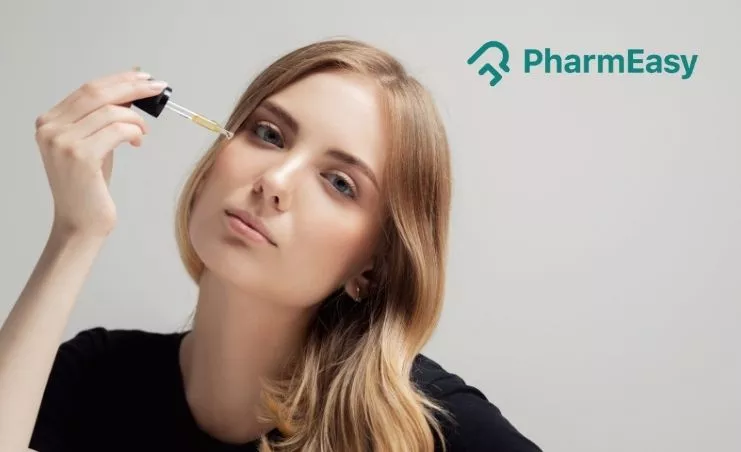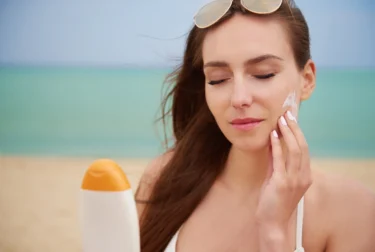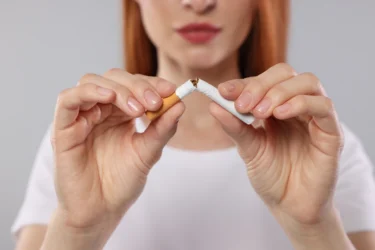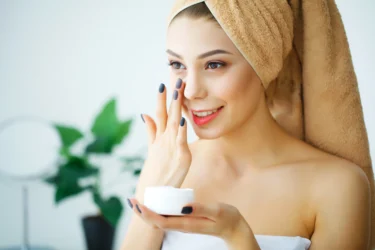Healthy Skin Tips: Research-Backed Strategies for a Glowing Complexion
By Dr. Raina N. Nahar +2 more

Get,

to manage your symptom
Get your,


4 Cr+ families
benefitted

OTP sent to 9988776655



You’ve successfully subscribed to receive
doctor-approved tips on
Whatsapp

Get ready to feel your best.

Hi There,
Download the PharmEasy App now!!


Register to Avail the Offer
Send OTPBy continuing, you agree with our Privacy Policy and Terms and Conditions

Hi There,
Sign up on PharmEasy now!!
Trusted by 4 crore+ families

OTP sent to 9988776655



You have unlocked 25% off on medicines




Code: NU25
By Dr. Raina N. Nahar +2 more
Table of Contents
Beautiful, glowing skin not only boosts our confidence but also reflects good overall health. However, achieving a radiant complexion takes effort, care, and consistency. This article will explore research-backed strategies that may help you maintain healthy, glowing skin. From the basics of a daily skincare routine to the importance of using sun protection, we’ll explore essential tips and habits that cater to different skin types.
We will provide you with actionable advice on how to potentially achieve and maintain healthy, glowing skin, discussing the role of nutrition, stress management, and skincare regimens. Lastly, we will answer some frequently asked questions regarding the same.

Before diving into specific tips for achieving healthy skin, it’s essential to understand the importance of a consistent skincare routine and identify your unique skin type. These two factors will set the foundation for choosing the right products and practices tailored to your skin’s specific requirements.
A consistent and well-rounded skincare routine is crucial for keeping your skin clean, clear, and protected. The three fundamental steps in a daily skincare routine are cleansing, toning, and moisturising.
Remember, a well-balanced skincare routine may help promote healthy skin function and combat common skin issues like acne, dryness, and signs of ageing.
Understanding your skin type is vital for selecting appropriate skincare products tailored to your skin’s specific requirements. There are five primary skin types:
Knowing your skin type allows you to customise your skincare routine to address specific concerns and maintain a healthy, balanced complexion.
Now that we’ve covered the basics, it’s time to delve into more targeted tips and strategies for maintaining a healthy skin. These are described below.

Protecting your skin from the harm caused by the sun is very important3.Too much sun can lead to early ageing, sunburn, and even skin cancer.

Smoking has a detrimental effect on skin health, causing premature ageing, wrinkles, and an increased risk of skin cancer.

Establishing a consistent and suitable skincare routine tailored to your skin type is instrumental in promoting healthy skin.

A well-balanced, nutrient-rich diet plays a significant role in maintaining healthy skin. Proper hydration and a diet rich in antioxidants, proteins, and healthy fats may improve skin quality and appearance.

Stress has a significant impact on skin health, exacerbating existing skin conditions and causing skin sensitivity and breakouts9. Increased stress levels can trigger hormone imbalances, leading to increased oil production, inflammation, and impaired skin barrier function. Below, we have described ways in which you may try to reduce stress.
Relaxation techniques
Incorporate stress reduction techniques into your daily routine, such as meditation, mindfulness, yoga, or deep breathing exercises.
Also Read: Amazing Benefits of Moringa for Your Skin!
Now that you’re equipped with essential skin health strategies, let’s explore some advanced skincare tips that may help you truly optimise your skin’s appearance and health.
Once you’ve identified your skin type from the five primary skin types mentioned earlier, you can customise your skincare routine. Choose products specifically formulated for your skin’s unique requirements. This may include targeted management options, specific moisturisers, or serums catering to your skin’s concerns.
Considering the vast array of skincare products available, it’s essential to know which ingredients are most beneficial for your skin type and concerns.
In addition to your skincare routine, adopt healthy lifestyle habits that possibly promote optimal skin health.
Also Read: 8 Beauty Benefits of Using Ice Cubes On The Skin
Everyone’s skin is unique, and special skin requirements may arise depending on factors such as age, skin condition, and even personal preferences. Here are some helpful tips to address these specific concerns.
With age comes the challenge of combating fine lines, wrinkles, and the loss of firmness. Use products containing ingredients like retinol and vitamin C that are said to boost collagen production and reduce the appearance of wrinkles12. Also, ensure consistent sun protection.
For individuals who frequently experience acne breakouts, choose non-comedogenic products (products that do not block pores). Use targeted therapy, such as salicylic acid or benzoyl peroxide, to combat acne-causing bacteria13.
Those with sensitive skin should opt for gentle, fragrance-free products that do not cause irritation or redness. Stick with a minimalistic skincare routine and do a patch test for new products before using them.
Darker skin tones can be more prone to hyperpigmentation and require a diligent sun protection routine. Choose broad-spectrum sunscreen with SPF 30 or higher, along with skincare products that help address uneven skin tone or dark spots.
Lighter skin tones are often more sensitive to sun exposure and prone to sunburn. Prioritise maintaining an effective sun protection routine with broad-spectrum sunscreen with SPF 30+ and minimise sun exposure during peak hours.
Also Read: Natural Home Remedies for Oily Skin
Achieving and maintaining healthy, glowing skin requires diligence, care, and consistency. By understanding the fundamental principles of skincare, knowing your skin type, and implementing a personalised skincare routine, you may improve your complexion and maintain its health for years to come.
Additionally, don’t underestimate the importance of a balanced diet, proper hydration, adequate sleep, stress management, and regular exercise as a part of a healthy lifestyle. When combined with your daily skincare regimen, these habits can help you achieve healthy and radiant skin.
Also Read: Natural Home Remedies for Hyperpigmentation
By consistently performing a gentle skincare routine, protecting your skin from the sun, maintaining a balanced diet, and practicing healthy lifestyle habits like exercise and proper sleep, you may achieve a healthy, glowing complexion.
To make your skin look healthier, be gentle when cleansing your skin, exfoliate once or twice a week, moisturise daily, and always apply sun protection when exposed to sunlight.
hile “perfect” skin may remain an unattainable standard, natural approaches to maintaining healthy skin include consuming nutrient-dense fruits and vegetables, staying hydrated, getting sufficient sleep, managing stress, exercising regularly, and practicing sun-safe habits.
To keep moisture in your skin, drink plenty of water, use lukewarm water while washing and bathing, apply a moisturiser suitable for your skin type, and utilise a humidifier to maintain indoor air humidity levels.
Yes, UV rays can penetrate the clouds, so using sunscreen daily is essential for preventing skin damage.
Disclaimer: The information provided here is for educational/awareness purposes only and is not intended to be a substitute for medical treatment by a healthcare professional and should not be relied upon to diagnose or treat any medical condition. The reader should consult a registered medical practitioner to determine the appropriateness of the information and before consuming any medication. PharmEasy does not provide any guarantee or warranty (express or implied) regarding the accuracy, adequacy, completeness, legality, reliability or usefulness of the information; and disclaims any liability arising thereof.
Links and product recommendations in the information provided here are advertisements of third-party products available on the website. PharmEasy does not make any representation on the accuracy or suitability of such products/services. Advertisements do not influence the editorial decisions or content. The information in this blog is subject to change without notice. The authors and administrators reserve the right to modify, add, or remove content without notification. It is your responsibility to review this disclaimer regularly for any changes.
Comments

Leave your comment...
You may also like
Comments